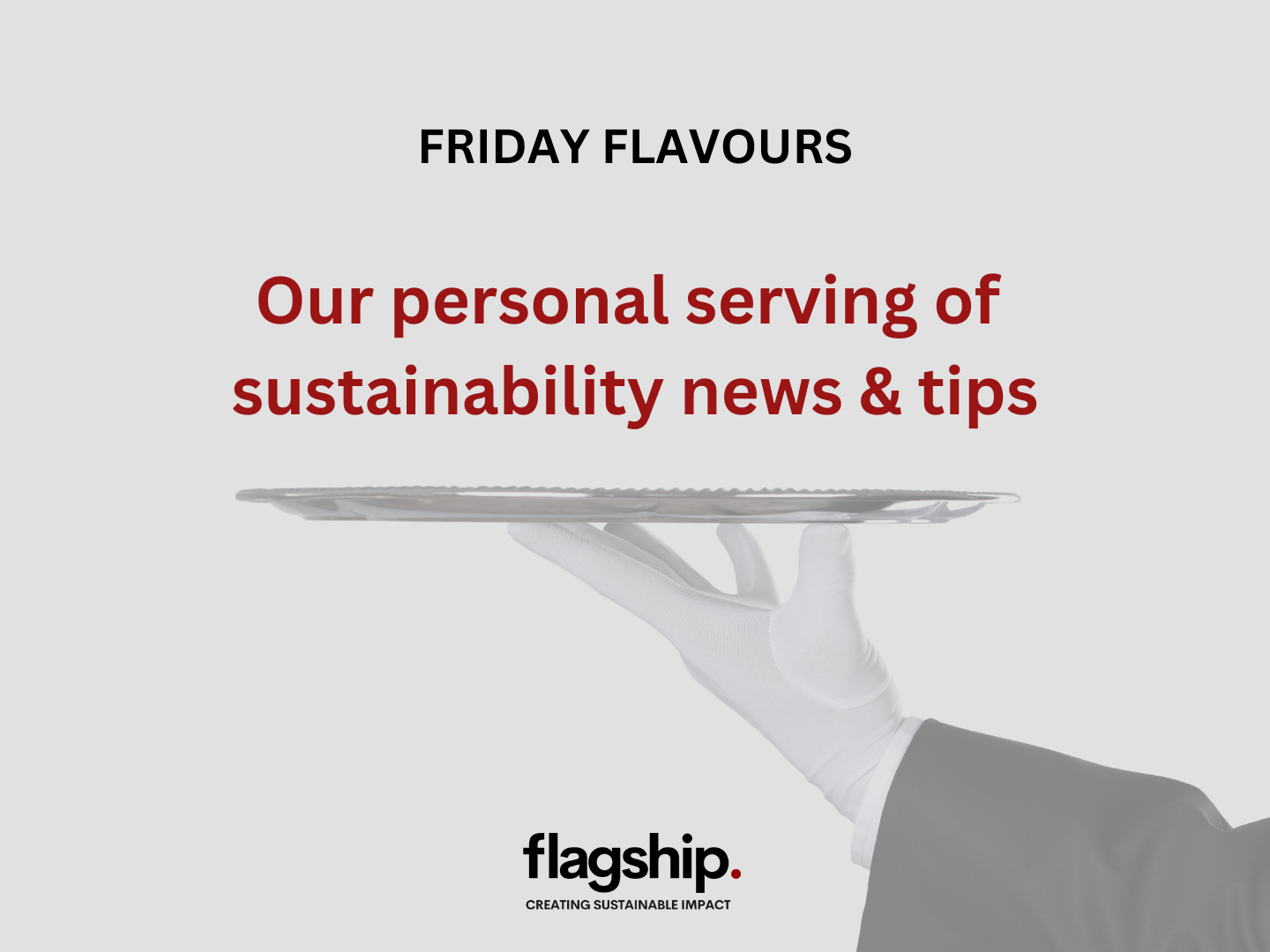The experts on our team regularly bring you a selection of recommendations and insights related to environmental and social responsibility. Whether it's an enticing book, an intriguing article, a project supporting a great cause or a helpful tool, we'll share our thoughts on why this particular piece spoke to us and why we think this particular topic is important.
Let us know what you think about our recommendations and insights, or whether you’d like to share some of your own tips with us - we’d love to hear from you.
Jana:
It's Christmas time, and just like Eva, I can't imagine not having a Christmas tree at home. But while trees are deeply interwoven into our cultural fabric through traditions like the Christmas tree and the Maypole, the reality of our forests' health is increasingly concerning. Forests cover about 39% of Europe, and even though they are gradually expanding, they face deepening impacts of climate change and atmospheric pollution, which pose risks to the vitality of forest soils and the health of trees. We adore these symbols of life and renewal in our homes and folklore yet frequently overlook their vital role in our ecosystem and our connection with them. This stark contrast between our cultural reverence for trees and the deteriorating health of our forests makes me particularly keen to read "The Hidden Life of Trees", Peter Wohlleben's book, which explores the unseen world of forests, offering a deeper understanding of how these ecosystems function and their importance to our planet. I also started reading Richard Powers' "The Overstory", which portrays trees as complex characters, intertwining their stories with those of humans. These narratives are a poignant reminder of the urgent need to reconcile our cultural practices with sustainable environmental stewardship, ensuring that our admiration for trees extends beyond seasonal traditions to a year-round commitment to correctly preserving these vital natural resources.
Jenny:
Before we had kids, my husband and I had found our own ways to celebrate Christmas more sustainably. We didn't have a tree but instead decorated our furniture. We started a tradition of gifting our parents, who live in different countries, a yearly calendar that we made using photos from the year, instead of buying them unnecessary things (how many more pairs of socks can your dad really need?). My husband "adopted" a baby sloth from the WWF for me one year, which I cherished. We generally try to only buy quality things that we need or to gift experiences. Now, with a toddler and a preschooler, things have gotten a bit more difficult. Kids seem to be attracted to all that is shiny, colorful, flashing, glittery, etc - i.e. all the things that are terrible for the planet. Our way around this has been to buy toys second-hand, from legos to books. I have bought a lot of things through facebook groups like this one or through online platforms like Vinted and Bazos. We have also instructed our families to avoid plastic when buying toys and to instead focus on puzzles, books and wooden toys. It sometimes feels like an uphill battle, but with this approach I think we have significantly reduced our footprint and still been able to give our kids joy at Christmas.
Katka:
Birds are incredibly fascinating creatures. Around 11,000 bird species have been described in the world. According to recent research, some birds are capable of activities just for pleasure; they can communicate with other species or solve puzzles that even a four-year-old child cannot. A crow, for example, can remember a person's face, and some other birds may even be more intelligent than dogs. How can you learn more about birds, and how can you help them? Some time ago, I discovered the Merlin Bird ID mobile application. We joke at home that it's like catching Pokemons with added value. The application can recognise a bird near you by voice, photo, size, colour or location, and subsequently, you can save the species in your "collection" and read more information about it. What I learned, thanks to Merlin, among other things, was the effect of feeding them at the feeders during winter. Feeders can fundamentally facilitate winter months for many species, but sometimes, this can harm them too. If you really want to help birds during winter, check out the tips from the Czech Ornithological Society, which is dedicated to these intelligent creatures in the Czech Republic. The CSO also organises the "Bird Hour" research every year, during which, with the public's help, it monitors the behaviour of wintering birds and the importance of feeding. The next one will take place at the beginning of January, and you can participate too! So get your binoculars ready and merry “catching”!
Martina R.:
Like the other team members, we also try to avoid the Christmas madness, which often involves unnecessary shopping. Even with children, we try to limit the number of presents under the tree to three. Especially with young children, this has worked well for us because opening presents in the evening is quite overwhelming for young children. If there are too many surprises, they stop enjoying it. For adults, we try to prioritise experiences and things they need or, ideally, agree to skip gifts amongst grown-ups altogether. If we do give presents, it's good to consider a reusable wrapping option, such as a fabric called furoshiki. This way, you give two gifts; the second is a fabric that can be reused and passed on to someone else. The best tip is to enjoy Christmas without stress in the way that suits you best, even if it means you may not want to celebrate Christmas at all.
Eva:
Only a few of us can imagine Christmas without a Christmas tree. However, when discussing sustainable holidays, it's impossible not to discuss the tree. Growing Xmas trees takes up land primarily used for growing other crops. In addition, pesticides are used in their cultivation. We must also consider the carbon footprint caused by transporting these trees over long distances to customers. Fortunately, today, we have other, more sustainable alternatives. Various services offer the rental of potted Christmas trees that can be returned so they can continue to grow, such as this service or this one. Wooden Christmas trees are also becoming increasingly popular. There are lots of options on the market, from trees made from wooden boards, pallets, or sticks. And if you are handy and have the skills, you can even make such a tree your own.
Martina P.:
The time before Christmas often inspires us to think about buying gifts not only for our loved ones but also for those in a difficult financial situation. People can support numerous financial or food collections or buy a specific gift for children in orphanages. Every year, my children and I fill 'Shoeboxes' with gifts for children to surprise them under the Christmas tree. Together, we wrap gifts that would make them happy, put them in shoeboxes, and take them to a collection point. From there, the Diakonie of the Czech Brethren Evangelical Church picks them up and distributes them to people in various crises. Another personal gift suggestion is to support the 'Life in a Suitcase' project, where purchasing a suitcase or other gift item contributes to abandoned newborns left at the hospital after birth, providing them with a large yellow suitcase filled with initial essentials and keepsake items.
Vojta:
Holidays are often unfortunately associated with a large amount of waste. The most specific type of waste is cooking oil, which definitely should not be poured down the sink or toilet - accumulated fats gradually solidify and adhere to surfaces, leading to problems in pipes and sewage treatment plants. Therefore, dispose of larger amounts of cooking oil by pouring it into a plastic bottle, and keep adding to it until it is full. Collection containers for oil can be found, for example, at https://www.kamsnim.cz, where you can also easily find out where to dispose of other types of waste. It's also good to think about wrapping paper. Most wrapping paper is waxed, so it doesn't belong in the blue recycling bin but in mixed waste. To help the environment, use wrapping paper without surface treatment, ideally from recycled materials and recyclable. Happy holidays!
Bára:
At Christmas, our family tries to cut back on quantity and focus on quality. The concept is that everyone says what they would like, and then one person gives a gift to just one person. This means everyone receives a present, the stress of thinking up and buying loads of (mostly unnecessary) gifts is eliminated, and the waste and carbon footprint associated with them is saved. At the same time, as we give thanks for having enough, we think of those who are not so lucky. My favourite project is the annual Czech Red Cross initiative, which gifts presents to children from shelters. Another project that I think of every year, bundled up in my winter coat, is Nocleženka. On the Salvation Army website, you can purchase a voucher worth 100 CZK, enabling one homeless person to spend a night in warmth. He or she will receive soup and bread and a hot drink, the opportunity to use the sanitary facilities, a health check-up, and an appointment with a social worker to help him or her deal with his or her life situation. One hundred crowns can change someone's life.


